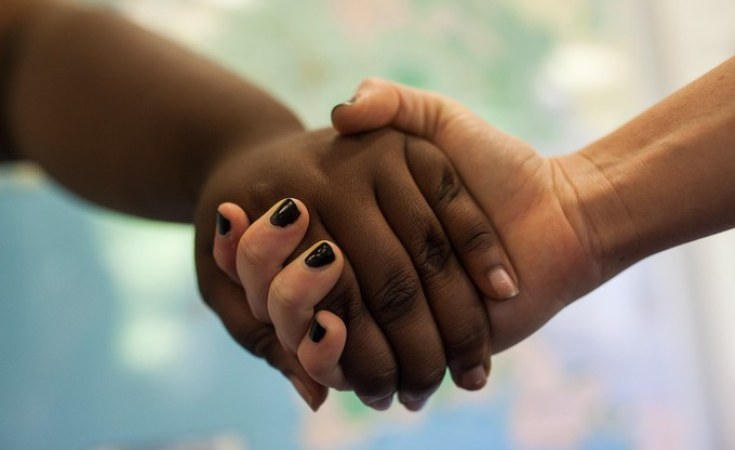TWO married couples battling to have their same-sex marriages recognised by the Namibian government were treated with "sheer rudeness" by officials of the Ministry of Home Affairs, Immigration, Safety and Security, a lawyer representing the government has acknowledged in the Supreme Court.
"I think the way they were treated by the officials in the [ministry] of home affairs was sheer rudeness," senior counsel Griffits Madonsela remarked during the hearing of arguments in a landmark case about the status of same-sex marriages in Namibia.
"But rudeness is not indignity in the sense it's envisaged in the Constitution. When people are rude to other people, generally that cannot mean that they are being treated institutionally with indignity," he added.
He made these remarks in response to a question from appeal judge Dave Smuts, who asked Madonsela if, considering the importance the Constitution attaches to human dignity, he was suggesting that the two couples involved in the two appeals before the court and the marriages they concluded outside Namibia have been treated with dignity by home affairs officials who have been dismissing their marriages as unrecognised in Namibia.
Five judges of the Supreme Court - chief justice Peter Shivute, deputy chief justice Petrus Damaseb, appeal judges Sylvester Mainga and Elton Hoff, and Smuts - heard arguments on the appeals by Namibian citizen Johann Potgieter and his South African husband, Daniel Digashu, and German citizen Anita Seiler-Lilles, who is in a same-sex marriage with her Namibian spouse, Anette Seiler, against a judgement that three judges of the High Court delivered in January last year.
In that judgement, the High Court - while voicing support for equal rights for people in same-sex relationships - turned down two applications to have the marriages of Potgieter and Digashu and of Seiler-Lilles and Seiler recognised in Namibia and to have residence rights in Namibia granted to Digashu and Seiler-Lilles.
The High Court dismissed the applications on the basis of a judgement of the Supreme Court, which in 2001 decided that same-sex relationships are not recognised in Namibia's Constitution and that same-sex couples are not protected as a family on an equal footing with heterosexual couples.
The three judges who heard the two couples' cases in the High Court indicated in their judgement that they disagreed with the Supreme Court's reasoning in the 2001 case of Chairperson of the Immigration Selection Board v Frank, but were nevertheless bound by that decision and could not overrule the Supreme Court's judgement.
They further indicated that they would urge the country's top court to reconsider its reasoning in the 2001 case.
Senior counsel Raymond Heathcote, representing Potgieter, Digashu and Seiler-Lilles, argued on Friday that the parts of the Supreme Court's 2001 judgement dealing with the legal status of same-sex relationships in Namibia were not binding on the High Court, as that was not not the basis on which the appeals court made its end decision in that case.
In any event, he added, the 2001 case was wrongly decided.
Heathcote stressed in his address to the five judges that the issue the appeals court has to decide now is not whether same-sex marriages should be legalised in Namibia, but whether same-sex marriages concluded in other countries are protected under Namibia's Constitution.
"The issue is confined," he said. "Does Namibia repudiate, chase away, not recognise same-sex people that are lawfully married in other countries according to those countries' laws? And we say, no ways does our Constitution repudiate that. In fact, it embraces them in their diversity."
On the Constitution's protection of human dignity, Heathcote said: "The whole principle of dignity is to protect minorities. If you leave the majority to determine what my dignity is, we can just as well throw the Constitution away."
He also argued that being part of a sexual minority in Namibia is a social status, with social status one of the grounds on which the Constitution prohibits discrimination.
The home affairs ministry's stance is that it does not recognise same-sex marriages because in its eyes such marriages are different and inferior to heterosexual marriages, Heathcote said. That stance of the ministry constitutes unfair discrimination, he argued.
Madonsela argued that the Supreme Court was correct in 2001, when it decided that a family as envisaged in the Constitution and the term "spouse" as used in the Immigration Control Act do not include people in same-sex relationships.
Madonsela conceded that sexual minorities have been stigmatised in Namibia, but also argued that the Constitution and international human rights agreements do include sexual orientation as a ground on which discrimination is prohibited.
The court reserved its judgement after hearing the arguments. The date when the judgement will be delivered will be announced when the decision is ready.


